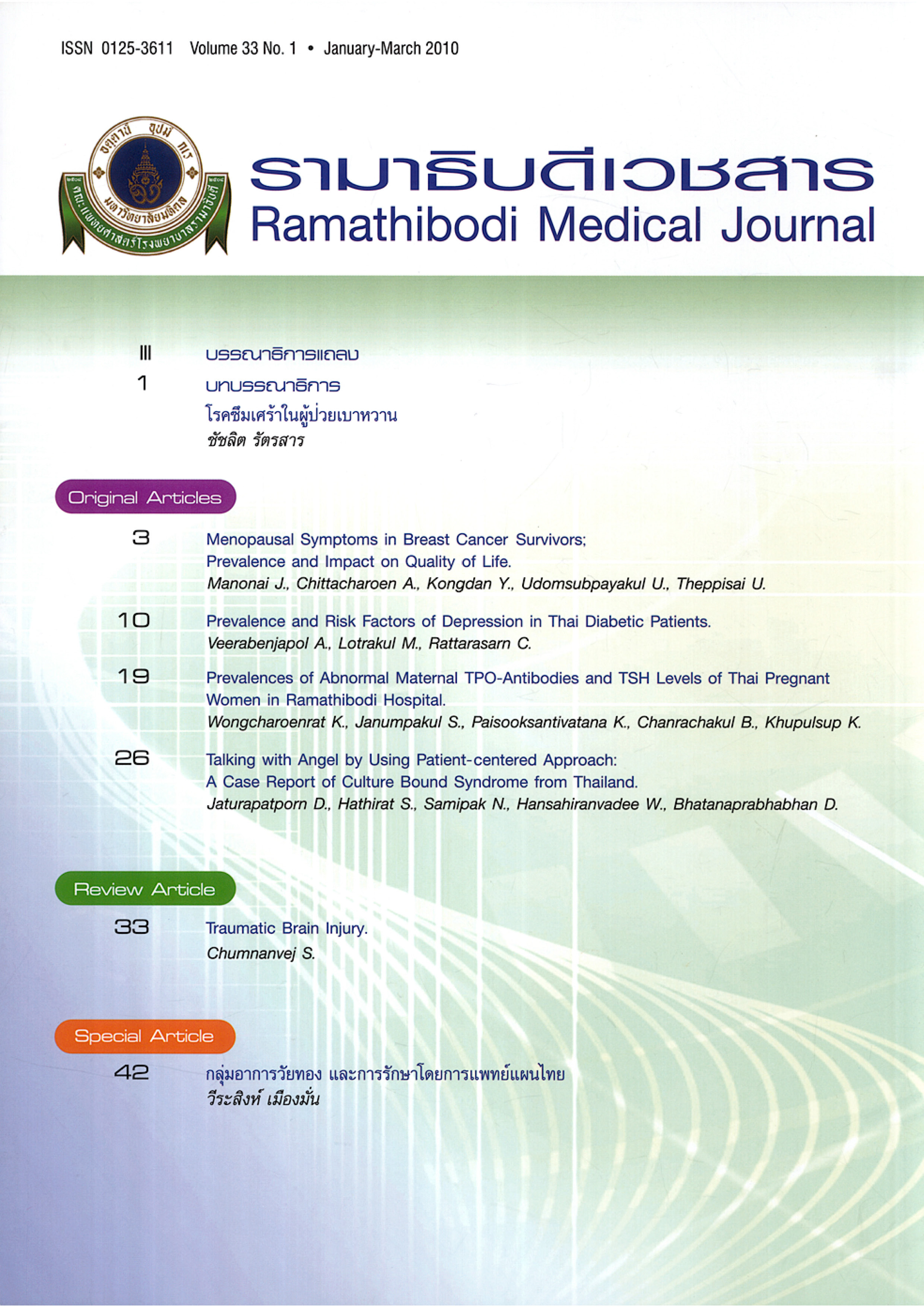Menopausal Symptoms in Breast Cancer Survivors; Prevalence and Impact on Quality of Life
Keywords:
Breast cancer survivors, Menopausal symptoms, Quality of lifeAbstract
Objectives: To study the prevalence of menopausal symptoms and quality of life in breast cancer survivors comparing to age-matched healthy female volunteers.
Method: From July 2004 to March 2005, a cross-sectional study was performed among samples of breast cancer survivors in Breast Clinic, Faculty of Medicine, Ramathibodi Hospital. One group for comparison was conducted on healthy women of the same age. Their menopausal symptoms were measured by using the Menopause Rating Scale. The menopause-specific questionnaire was used to evaluate their quality of life.
Results: A total of 97 breast cancer survivors and 95 age-matched healthy women completed the questionnaire. The study group had significantly experienced depressive symptoms more frequently than the control group. Comparing the median scores of quality of life between two groups, there was no significant difference except that vasomotor domain was higher in breast cancer survivors.
Conclusion: All breast cancer survivors had experienced menopausal symptoms which negatively correlated with their quality of life. Depressive mood was found more commonly comparing to women without breast cancer.
References
Parkin DM. Global cancer statistics in the year 2000. Lancet Oncol. 2001;2(9):533-43. doi:10.1016/S1470-2045(01)00486-7.
Burstein HJ, Winer EP. Primary care for survivors of breast cancer. N Engl J Med. 2000;343(15):1086-94. doi:10.1056/NEJM200010123431506.
Yen JY, Ko CH, Yen CF, Yang MJ, Wu CY, Juan CH, et al. Quality of life, depression, and stress in breast cancer women outpatients receiving active therapy in Taiwan. Psychiatry Clin Neurosci. 2006;60(2):147-53. doi:10.1111/j.1440-819.2006.01479.x.
Schultz PN, Klein MJ, Beck ML, Stava C, Sellin RV. Breast cancer: relationship between menopausal symptoms, physiologic health effects of cancer treatment and physical constraints on quality of life in long-term survivors. J Clin Nurs. 2005;14(2):204-11. doi:10.1111/j.1365-2702.2004.01030.x.
Tchen N, Juffs HG, Downie FP, Yi QL, Hu H, Chemerynsky I, et al. Cognitive function, fatigue, and menopausal symptoms in women receiving adjuvant chemotherapy for breast cancer. J Clin Oncol. 2003;21(22):4175-83. doi:10.1200/JCO.2003.01.119.
Crandall C, Petersen L, Ganz PA, Greendale GA. Association of breast cancer and its therapy with menopause-related symptoms. Menopause. 2004;11(5):519-30. doi:10.1097/01.GME.0000117061.40493.AB.
Fan HG, Houédé-Tchen N, Yi QL, Chemerynsky I, Downie FP, Sabate K, et al. Fatigue, menopausal symptoms, and cognitive function in women after adjuvant chemotherapy for breast cancer: 1- and 2-year follow-up of a prospective controlled study. J Clin Oncol. 2005;23(31):8025-32. doi:10.1200/JCO.2005.01.6550.
Carpenter JS, Andrykowski MA, Cordova M, Cunningham L, Studts J, McGrath P, et al. Hot flashes in postmenopausal women treated for breast carcinoma: prevalence, severity, correlates, management, and relation to quality of life. Cancer. 1998;82(9):1682-91.
Carpenter JS, Johnson D, Wagner L, Andrykowski M. Hot flashes and related outcomes in breast cancer survivors and matched comparison women. Oncol Nurs Forum. 2002;29(3):E16-25. doi:10.1188/02.ONF.E16-E25.
Shim EJ, Mehnert A, Koyama A, Cho SJ, Inui H, Paik NS, et al. Health-related quality of life in breast cancer: a cross-cultural survey of German, Japanese, and South Korean patients. Breast Cancer Res Treat. 2006;99(3):341-50. doi:10.1007/s10549-006-9216-x.
Schneider HP, Heinemann LA, Rosemeier HP, Potthoff P, Behre HM. The Menopause Rating Scale (MRS): reliability of scores of menopausal complaints. Climacteric. 2000;3(1):59-64.
Hilditch JR, Lewis J, Peter A, van Maris B, Ross A, Franssen E, et al. A menopause-specific quality of life questionnaire: development and psychometric properties. Maturitas. 1996;24(3):161-75. doi:10.1016/S0378-5122(96)82006-8.
Conde DM, Pinto-Neto AM, Cabello C, Sá DS, Costa-Paiva L, Martinez EZ. Menopause symptoms and quality of life in women aged 45 to 65 years with and without breast cancer. Menopause. 2005;12(4):436-43. doi:10.1097/01.GME.0000151655.10243.48.
Conde DM, Pinto-Neto AM, Cabello C, Santos-Sá D, Costa-Paiva L, Martinez EZ. Quality of life in Brazilian breast cancer survivors age 45-65 years: associated factors. Breast J. 2005;11(6):425-32. doi:10.1111/j.1075-122X.2005.00124.x.
Kornblith AB, Ligibel J. Psychosocial and sexual functioning of survivors of breast cancer. Semin Oncol. 2003;30(6):799-813. doi:10.1053/j.seminoncol.2003.08.025.
Gold EB, Sternfeld B, Kelsey JL, Brown C, Mouton C, Reame N, et al. Relation of demographic and lifestyle factors to symptoms in a multi-racial/ethnic population of women 40-55 years of age. Am J Epidemiol. 2000;152(5):463-73.













